Public lecture about Lovas


On October 18th 1991, Serbian Army volunteers led by Yugoslav People’s Army (JNA) officers forced fifty Croats from Lovas near Vukovar to go to a minefield near the village. On the way to the minefield,
members of the Serb forces killed one of the detained Croat soldiers. When they came to the minefield, the remaining detainees were forced to enter it and clean the ground with their own feet in order to clear it of mines.
At least one mine exploded, while members of the Serbian forces opened fire, killing 20 detainees, and wounding 12 of them.
This incident was preceded by the psychological and physical torture over several days of local Croatians from Lovas, the deliberate destruction of their houses, killings, detentions and discrimination, such as forcing them to wear white armbands or marking their houses with white fabrics.
On the occasion of the 26th anniversary of the suffering of the inhabitants of Lovas, the Humanitarian Law Center invites you to a public lecture about these incidents in and around Lovas occurring in the autumn of 1991, as well as about the course of court proceedings in Serbia since 2007.
The lecture will be held by the legal representative of the victims, lawyer Marina Kljaić.
This public lecture will be held at the library of the Humanitarian Law Center (Dečanska 12/III), on October 18, 2017, starting at 18:00.
The lecture will be held in local (BCS) languages.
















 On Tuesday, August 22nd, 2017, the Humanitarian Law Center (HLC) presented the report
On Tuesday, August 22nd, 2017, the Humanitarian Law Center (HLC) presented the report 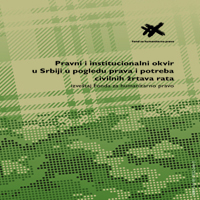
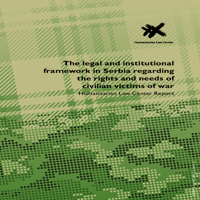 rmed conflicts in the territories of the former Yugoslavia lasted from 1991 to 2001. The wars in Croatia (1991-1995), Bosnia and Herzegovina (1992-1995) and Kosovo (1998-1999) resulted in the mass murders of civilians, ethnic cleansing and persecution of hundreds of thousands of people, but also a large number of grave crimes unseen in Europe since World War II. Serbia had an active and involved role in these conflicts. In the context of the armed conflicts, the authorities in Serbia during this entire period were responsible for serious violations of the fundamental rights of its own citizens from the ranks of national minorities, as well as of some members of the majority Serbian population. In Serbia today there are a significant number of citizens who came to Serbia as refugees owing to the wars in other countries of the former Yugoslavia, and most of them have remained in Serbia permanently. Among them are a fair number who survived crimes, whose physical and psychological consequences they suffer to this day, as well as many of those who lost one or more family members in the war.
rmed conflicts in the territories of the former Yugoslavia lasted from 1991 to 2001. The wars in Croatia (1991-1995), Bosnia and Herzegovina (1992-1995) and Kosovo (1998-1999) resulted in the mass murders of civilians, ethnic cleansing and persecution of hundreds of thousands of people, but also a large number of grave crimes unseen in Europe since World War II. Serbia had an active and involved role in these conflicts. In the context of the armed conflicts, the authorities in Serbia during this entire period were responsible for serious violations of the fundamental rights of its own citizens from the ranks of national minorities, as well as of some members of the majority Serbian population. In Serbia today there are a significant number of citizens who came to Serbia as refugees owing to the wars in other countries of the former Yugoslavia, and most of them have remained in Serbia permanently. Among them are a fair number who survived crimes, whose physical and psychological consequences they suffer to this day, as well as many of those who lost one or more family members in the war.

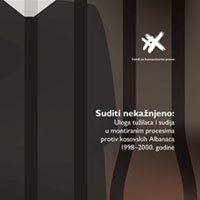
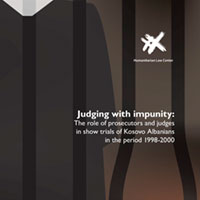 Around the end of 1996 and the beginning of 1997, the offices of district public prosecutors began indicting Kosovo Albanians en masse, pursuant to Article 125 of the CCY (with reference to terrorism) and Article 136, paragraphs 1 and 2 of the CCY (with reference to association for the purpose of conducting hostile activities). The trials for the above-cited charges were conducted by district courts in Kosovo during 1998 and 1999, more specifically until 9 June 1999 when the Kumanovo Agreement was signed and the army and police began their withdrawal from the territory of Kosovo.
Around the end of 1996 and the beginning of 1997, the offices of district public prosecutors began indicting Kosovo Albanians en masse, pursuant to Article 125 of the CCY (with reference to terrorism) and Article 136, paragraphs 1 and 2 of the CCY (with reference to association for the purpose of conducting hostile activities). The trials for the above-cited charges were conducted by district courts in Kosovo during 1998 and 1999, more specifically until 9 June 1999 when the Kumanovo Agreement was signed and the army and police began their withdrawal from the territory of Kosovo. 
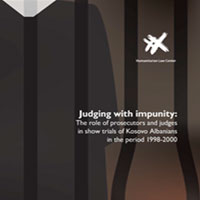 The Humanitarian Law Center will present the Report titled „ Judging with impunity: The role of prosecutors and judges in show trials of Kosovo Albanians in the period 1998-2000“, on Tuesday, July 25th, 2017. The presentation will take place in the Great Hall of the Media Center in Belgrade (Terazije nr. 3, II floor) at 11:00.
The Humanitarian Law Center will present the Report titled „ Judging with impunity: The role of prosecutors and judges in show trials of Kosovo Albanians in the period 1998-2000“, on Tuesday, July 25th, 2017. The presentation will take place in the Great Hall of the Media Center in Belgrade (Terazije nr. 3, II floor) at 11:00.


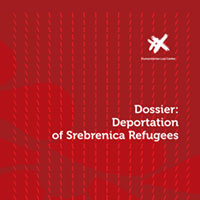 After the fall of Srebrenica on 11 July, 1995, an estimated 7,905 persons disappeared, mostly men considered by the Army of Republika Srpska as “able-bodied”. DNA analysis of the mortal remains of those found in mass graves, to date, has enabled positive identification of 5,977 persons killed in Srebrenica.
After the fall of Srebrenica on 11 July, 1995, an estimated 7,905 persons disappeared, mostly men considered by the Army of Republika Srpska as “able-bodied”. DNA analysis of the mortal remains of those found in mass graves, to date, has enabled positive identification of 5,977 persons killed in Srebrenica.